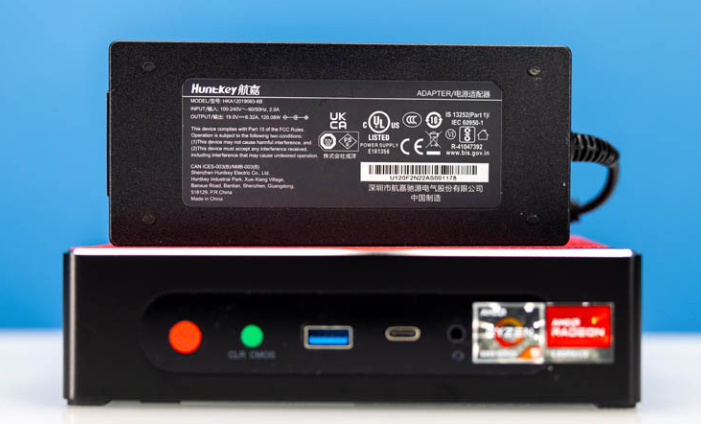With computers becoming increasingly compact, Mini PCs have emerged as an ideal choice for many home and business users. They are known for their compact design, lower power consumption, and quiet operation, making them suitable for office use, home entertainment systems, and light gaming. But for any computer, the power supply unit (PSU) plays a critical role. A good power supply not only ensures the stable operation of the device but can also improve overall performance. So how do Mini PC power supplies perform in terms of stability, performance, and efficiency? In this article, we’ll explore the power supplies of Mini PCs in detail and provide guidance on how to choose the right one for your needs.
Due to the compact design of Mini PCs, their power supplies have more demanding requirements compared to traditional desktop PCs. Instead of large internal power supplies, Mini PCs typically feature either external power adapters or small built-in power supplies. The most common types include:
External Power Adapters: Similar to laptop chargers, these adapters convert household AC power into the appropriate DC output for the Mini PC. They usually range from 60W to 120W, which is sufficient for most lightweight Mini PCs.
Built-in Power Modules: Some high-performance Mini PCs have internal power supplies, with capacities between 150W and 300W. These power supplies provide more power but often come with trade-offs in terms of heat management due to limited space.
High-efficiency External Power Supplies (e.g., GaN Chargers): As Gallium Nitride (GaN) technology becomes more widespread, some Mini PCs support compact, high-efficiency external power adapters. These power supplies provide sufficient wattage while excelling in energy efficiency and heat dissipation.

Stability is a key criterion when selecting a power supply. A power supply's primary function is to provide stable voltage and current to the system. Poor-quality power supplies can cause problems like voltage fluctuations, unexpected reboots, or even hardware damage. Given the compact nature of Mini PCs, where components are packed tightly together, heat management becomes a bigger concern, and low-quality power supplies can exacerbate thermal issues, further shortening the system's lifespan.
For Mini PCs, it’s generally recommended to choose reliable external power adapters. Major brands like Dell, Lenovo, and Intel typically bundle well-tested adapters with their Mini PCs to ensure long-term stability. These adapters often come with multiple safety features, including overvoltage, overcurrent, and short circuit protection, reducing the risk of system failures due to power issues.
Additionally, the internal circuitry design of Mini PCs affects power stability. High-quality motherboards often feature more efficient power management circuits, which further enhance the stability of the device.
Despite the relatively low wattage of Mini PC power supplies, they can still deliver solid performance. Many modern Mini PCs use low-power processors like Intel Core i3/i5/i7 or AMD Ryzen series, which typically consume between 15W and 45W. As a result, even a 60W power adapter is sufficient to power most Mini PCs.
Other components like SSDs and RAM in Mini PCs also consume less power compared to traditional desktop components. SSDs, for example, are far more power-efficient than traditional hard drives (HDDs), and compact DDR4 or DDR5 RAM modules are designed for energy efficiency. This means that the overall power consumption of a Mini PC is generally low, allowing smaller power supplies to support stable, long-term operation.
However, for users requiring more performance, such as video editing, light gaming, or multitasking, a low-wattage power supply may not suffice. High-end Mini PCs that feature built-in power supplies or support dedicated graphics cards (with power ratings of up to 300W) are better suited for such tasks. These power supplies deliver performance comparable to that of traditional desktop PCs, providing the necessary power for demanding workloads.
Efficiency is another critical factor in assessing the quality of a power supply. High-efficiency power supplies not only save electricity but also generate less heat, improving the overall lifespan of the device. Many Mini PC power adapters comply with 80 Plus efficiency certifications, which means they can achieve an efficiency rating of 80% or higher under full load. Some high-end power supplies can even reach efficiency levels of 90% or more.
Some high-performance Mini PCs also support modern power management technologies like USB-C Power Delivery, which allows power delivery through a USB-C port. This not only simplifies the power connection but also improves energy efficiency.
With the ongoing development of Gallium Nitride (GaN) technology, future Mini PC power adapters will become even smaller and more efficient. GaN power supplies generate less heat at equivalent power levels and have higher efficiency, making them well-suited for space-constrained Mini PC designs.

When selecting a power supply for your Mini PC, it’s important to assess your usage needs. If you plan to use your Mini PC for office work, web browsing, or home entertainment, a power adapter in the 60W to 120W range will likely meet your needs. For more performance-intensive tasks such as video editing, programming, or multitasking, consider a higher wattage power supply, ranging from 150W to 300W, which will provide more stable performance.
Additionally, you should consider the brand and certification of the power supply. Opting for power adapters from reputable brands can ensure higher quality and reliability, while 80 Plus certification guarantees better energy efficiency. For users who need flexibility and portability, consider Mini PCs that support USB-C Power Delivery, which allows you to use a single charger across multiple devices, reducing the need to carry multiple adapters.
In summary, Mini PC power supplies generally offer good performance, especially in terms of stability and efficiency. Small-wattage power supplies are sufficient for most everyday computing tasks, and as technology advances, future power adapters are expected to improve in size, efficiency, and performance. Choosing the right power supply ensures stable, long-term operation for your Mini PC and enhances your overall user experience.